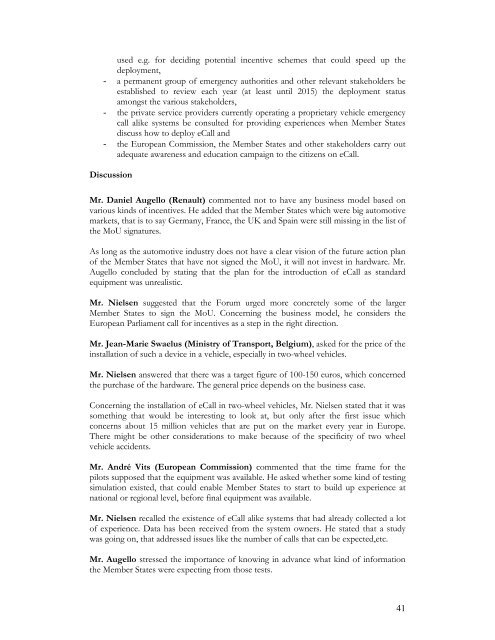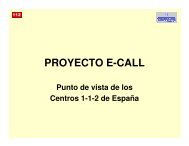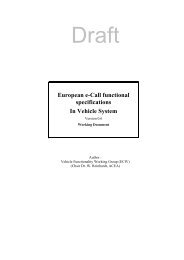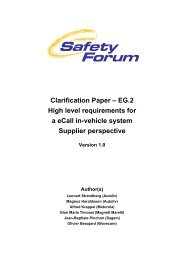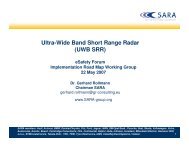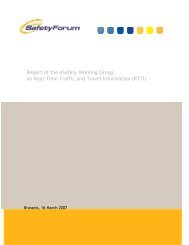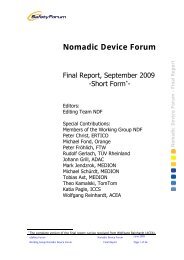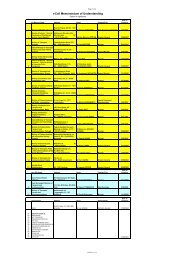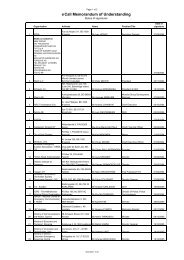- Page 1 and 2: eSafety Compendium Addendum 1 - Dec
- Page 4 and 5: Table of contents Introduction.....
- Page 6 and 7: 4.3.2 List of Participants.........
- Page 8 and 9: INTRODUCTION 7
- Page 10 and 11: Chapter 1 - EUROPEAN COMMISSION ESA
- Page 13 and 14: Chapter 2 - ESAFETY FORUM PLENARY M
- Page 15 and 16: Moderator: Mr. Fabio Colasanti, Dir
- Page 17 and 18: Day 2 09.00 - 09.30 Coffee Chair: M
- Page 19 and 20: 2.1.3 Participants List Surname Nam
- Page 21 and 22: PUTZ Stéphane eSafety Support QUOI
- Page 23 and 24: He concluded by insisting on the im
- Page 25 and 26: of accidents and that in almost 75%
- Page 27 and 28: Mr. Harbour noted that this year, w
- Page 29 and 30: As far as China is concerned, the m
- Page 31 and 32: - promote the market penetration of
- Page 33 and 34: Mr. Stevens outlined the implementa
- Page 35 and 36: - request that traffic management c
- Page 37 and 38: - The availability of the safety at
- Page 39 and 40: 2.1.4.5 Update of the status of the
- Page 41: take responsibility. Mr. Jenssen hi
- Page 45 and 46: Ivan Hodac (ACEA) emphasised the im
- Page 47 and 48: Dr. van Zyl concluded by announcing
- Page 49 and 50: Discussing the need for peer-to-pee
- Page 51 and 52: Communications Working Group Mr. Uw
- Page 53 and 54: - Increased productivity - Increase
- Page 55 and 56: The i2010 Intelligent Car Initiativ
- Page 57 and 58: Eurobarometer survey on safety: pre
- Page 59 and 60: participating in a study that had n
- Page 61: 7. Emphasises the need of having a
- Page 64 and 65: 11.30 - 12.15 The eSafety Working G
- Page 66 and 67: 2.2.3 Participants List Last Name F
- Page 68 and 69: SEDDI Malika ASFA SERGEYS Filip Hon
- Page 70 and 71: • Cars21 presented an integrated
- Page 72 and 73: Ms Rosalie Zobel, the chair, remind
- Page 74 and 75: ◊ protected spectrum (ideally wit
- Page 76 and 77: Mr Strohmeier said that DG Informat
- Page 78 and 79: Mr Rob van Essen began by giving an
- Page 80 and 81: o The Pan-European Emergency Call S
- Page 82 and 83: o Results TRACE project on EU datab
- Page 84: o 13 or 14 September eSafety Forum
- Page 87 and 88: This chapter contains the minutes o
- Page 89 and 90: 3.1.2 Participants List Organisatio
- Page 91 and 92: � Actions: - eSafety Support to i
- Page 93 and 94:
André Vits (EC, chair) proposed st
- Page 95 and 96:
5.4 - eCall DG - Gloria Pellischek
- Page 97 and 98:
10 - A.O.B. No other business. 11 -
- Page 99 and 100:
3.2.2 List of Participants Organisa
- Page 101 and 102:
2 - Debrief of eSafety Support Acti
- Page 103 and 104:
André Vits proposed to have as spe
- Page 105 and 106:
4.5 - RTD Working Group Ulf Palmqvi
- Page 107 and 108:
was too much car-oriented, and the
- Page 109 and 110:
3.3.2 Participants List Organisatio
- Page 111 and 112:
Juhani Jaaskelainen (EC) presented
- Page 113 and 114:
o Infrastructural measures reducing
- Page 115 and 116:
Risto Kulmala finally reported on t
- Page 117 and 118:
� Action: eSafety Support to supp
- Page 119 and 120:
5 July - Implementation Road Maps W
- Page 121 and 122:
3.4.2 List of Participants Organisa
- Page 123 and 124:
Ulf Palmquist reported that Ben Tha
- Page 125 and 126:
Heinz Friedrichs (Bosch) suggested
- Page 127 and 128:
Risto Kulmala asked the SG to contr
- Page 129 and 130:
Chapter 4 - ESAFETY OBSERVERS MEETI
- Page 131 and 132:
15.30 - 15.45 Coffee Break Mr Paulo
- Page 133 and 134:
Paul Ana CTAG ana.paul@ctag.com Ped
- Page 135 and 136:
public aware of the importance of i
- Page 137 and 138:
- Build a VMS standard catalogue DG
- Page 139 and 140:
Mr Bangsgaard highlighted the fact
- Page 141 and 142:
4.2.2 Participants List Last name F
- Page 143 and 144:
Mr. Vits stressed the need to keep
- Page 145 and 146:
The main conclusions from Mr. Stafb
- Page 147 and 148:
Mr. Adamsson answered that Volvo Tr
- Page 149 and 150:
4.3 3 rd eSafety Observers Regional
- Page 151 and 152:
RF-based Communication and Localisa
- Page 153 and 154:
KOOSS Dieter University Karlsruhe L
- Page 155 and 156:
The relevance of the eSafety initia
- Page 157 and 158:
The CVIS Integrated Project, Mr Gin
- Page 159 and 160:
• Promoting integration and stand
- Page 161 and 162:
160
- Page 163 and 164:
15.30 - 15.45 Coffee Break Yiannis
- Page 165 and 166:
PAGLÉ Katia ICCS SERMPIS Dimitris
- Page 167 and 168:
Mr Ferreira was queried by the part
- Page 169 and 170:
Mrs Testaferrata concluded by repor
- Page 171 and 172:
Dr Chochliouros main conclusions we
- Page 173 and 174:
4.5 4 th eSafety Observers European
- Page 175 and 176:
4.5.2 List of Participants LAST NAM
- Page 177 and 178:
Presentation Swedish ITS Strategy 2
- Page 179 and 180:
Spain - Francisco Sanchez: The main
- Page 181 and 182:
Traffic management systems implicit
- Page 183 and 184:
France - Pierre Lereboullet: France
- Page 185 and 186:
184
- Page 187 and 188:
5.1 List of recommendations The eSa
- Page 189 and 190:
European R&D: APROSYS (www.aprosys.
- Page 191 and 192:
5.1.2 Impact assessment of safety s
- Page 193 and 194:
Recommendation number and title: 4)
- Page 195 and 196:
5.1.3 Human-Machine Interaction Rec
- Page 197 and 198:
The EC has acted on one of the reco
- Page 199 and 200:
National activities: The Implementa
- Page 201 and 202:
subsidiarity are other important de
- Page 203 and 204:
traffic safety, efficiency and redu
- Page 205 and 206:
Recommendation number and title: 9)
- Page 207 and 208:
The working group copes with spectr
- Page 209 and 210:
National activities: (not available
- Page 211 and 212:
5.1.6 The European Safety Map datab
- Page 213 and 214:
FeedMAP is developing a framework t
- Page 215 and 216:
Having recognised the absolute nece
- Page 217 and 218:
The German Federal Ministry of the
- Page 219 and 220:
5.1.8 Real-time Traffic and Travell
- Page 221 and 222:
of public-private partnerships, and
- Page 223 and 224:
5.1.9 Motor vehicle type-approval l
- Page 225 and 226:
5.1.10 Safety systems standards and
- Page 227 and 228:
eSafety Working Groups: The eSafety
- Page 229 and 230:
On October 2006 the RESPONSE 3 proj
- Page 231 and 232:
Systems; and the status of current
- Page 233 and 234:
A survey on “Incentives schemes a
- Page 235 and 236:
Recommendation number and title: 24
- Page 237 and 238:
5.1.14 The different business cases
- Page 239 and 240:
Recommendation number and title: 26
- Page 241 and 242:
5.1.15 User Outreach Recommendation
- Page 243 and 244:
eSafety Working Groups: The User Ou
- Page 245 and 246:
the eCall and User Outreach Working
- Page 247 and 248:
Future actions: For 2007 the safety
- Page 249 and 250:
248
- Page 251 and 252:
The eSafety Working Groups are focu
- Page 253 and 254:
The Human Machine Interaction Worki
- Page 255 and 256:
6.1.6 Implementation Road Maps Work
- Page 257 and 258:
The development of the Intelligent
- Page 259 and 260:
Real-time traffic and travel inform
- Page 261 and 262:
6.2 Final Recommendations of the eS
- Page 263 and 264:
ANNEX I - 3 RD ESAFETY COMMUNICATIO
- Page 265 and 266:
COMMUNICATION FROM THE COMMISSION T
- Page 267 and 268:
Another major milestone was the ado
- Page 269 and 270:
France Procedure started Introduced
- Page 271 and 272:
(a) To this effect, the Member Stat
- Page 273 and 274:
5. CONCLUSIONS While the number of
- Page 275 and 276:
1. ANNEX II - RECOMMENDATIONS OF TH
- Page 277 and 278:
Table of content CHAPTER 1 - ESAFET
- Page 279 and 280:
Chapter 2 - eCall Process 2.1 DG eC
- Page 281 and 282:
Recommendations of the DG eCall for
- Page 283 and 284:
Recommendations of the DG eCall for
- Page 285 and 286:
4.2.1 Performance criteria end-to-e
- Page 287 and 288:
4.2.2.4 eCall Minimum Set of Data (
- Page 289 and 290:
Recommendations of the DG eCall for
- Page 291 and 292:
5.3 Privacy Recommendations of the
- Page 293 and 294:
Recommendations of the DG eCall for
- Page 295 and 296:
Appendix list Recommendations for t
- Page 297 and 298:
eCall Driving Group - Participants
- Page 299 and 300:
FIGIEFA/CLEDIPA Sylvia Gotzen sylvi
- Page 301 and 302:
RBS Insurance - Direct Line Group L
- Page 303 and 304:
Recommendations for the introductio
- Page 305 and 306:
2 DG eCall meetings High Level meet
- Page 307 and 308:
Table of Contents eSafety Forum eCa
- Page 309 and 310:
2. Involved Parties European MoU fo
- Page 311 and 312:
European MoU for Realisation of Int
- Page 313 and 314:
European MoU for Realisation of Int
- Page 315 and 316:
Page 1 of 2 Organisation Address Na
- Page 317 and 318:
Recommendations for the introductio
- Page 319 and 320:
Support from the Member States was
- Page 321 and 322:
Real-Time Traffic And Travel Inform
- Page 323 and 324:
Member States should: 1. Ensure tha
- Page 325 and 326:
The eCall Driving Group drafted an
- Page 327 and 328:
TABLE XX Recommendations of the eCa
- Page 329 and 330:
There was unanimous support for the
- Page 331 and 332:
COUNCIL DECISION COUNCIL DECISION o
- Page 333 and 334:
COUNCIL DECISION (2) OJ No C 231, 1
- Page 335 and 336:
L 108/52 24.4.2002 Official Journal
- Page 337 and 338:
L 108/54 24.4.2002 Official Journal
- Page 339 and 340:
L 108/56 24.4.2002 Official Journal
- Page 341 and 342:
L 108/58 24.4.2002 Official Journal
- Page 343 and 344:
L 108/60 24.4.2002 Official Journal
- Page 345 and 346:
L 108/62 24.4.2002 Official Journal
- Page 347 and 348:
L 108/64 24.4.2002 Official Journal
- Page 349 and 350:
L 108/66 24.4.2002 Official Journal
- Page 351 and 352:
L 108/68 24.4.2002 Official Journal
- Page 353 and 354:
L 108/70 24.4.2002 Official Journal
- Page 355 and 356:
L 108/72 24.4.2002 Official Journal
- Page 357 and 358:
L 108/74 24.4.2002 Official Journal
- Page 359 and 360:
L 108/76 24.4.2002 Official Journal
- Page 361 and 362:
31.7.2002 EN Official Journal of th
- Page 363 and 364:
31.7.2002 L 201/39 Official Journal
- Page 365 and 366:
31.7.2002 L 201/41 Official Journal
- Page 367 and 368:
31.7.2002 EN Official Journal of th
- Page 369 and 370:
31.7.2002 L 201/45 Official Journal
- Page 371 and 372:
31.7.2002 L 201/47 Official Journal
- Page 373 and 374:
States is set to increase; whereas
- Page 375 and 376:
order to avoid any circumvention of
- Page 377 and 378:
(34) Whereas Member States must als
- Page 379 and 380:
will normally be considered control
- Page 381 and 382:
(64) Whereas the authorities in the
- Page 383 and 384:
(g) 'recipient' shall mean a natura
- Page 385 and 386:
Article 7 CRITERIA FOR MAKING DATA
- Page 387 and 388:
journalistic purposes or the purpos
- Page 389 and 390:
Article 13 Exemptions and restricti
- Page 391 and 392:
Confidentiality of processing Any p
- Page 393 and 394:
(b) the purpose or purposes of the
- Page 395 and 396:
Article 25 Principles CHAPTER IV TR
- Page 397 and 398:
Article 27 CODES OF CONDUCT 1. The
- Page 399 and 400:
Article 29 Working Party on the Pro
- Page 401 and 402:
Article 32 FINAL PROVISIONS 1. Memb
- Page 403 and 404:
COMMISSION OF THE EUROPEAN COMMUNIT
- Page 405 and 406:
5.3. Encouraging the improvement of
- Page 407 and 408:
e covered by a forthcoming Commissi
- Page 409 and 410:
Number of people killed 400 350 300
- Page 411 and 412:
2. SETTING THE TARGET OF REDUCING T
- Page 413 and 414:
3.2. All stakeholders in the transp
- Page 415 and 416:
makers, professionals and the publi
- Page 417 and 418:
on the technological and institutio
- Page 419 and 420:
group behaviour) mean that in some
- Page 421 and 422:
The Commission also intends to come
- Page 423 and 424:
5.2.2. Consumer information: the Eu
- Page 425 and 426:
� Adapt to technical progress the
- Page 427 and 428:
The impact of the new technologies
- Page 429 and 430:
It also examines its accession to t
- Page 431 and 432:
with the considerable growth in int
- Page 433 and 434:
� Achieve a high level of safety
- Page 435 and 436:
international carriers. To remedy t
- Page 437 and 438:
on-board devices (black boxes) to r
- Page 439 and 440:
5.6.4. The consequences of accident
- Page 441 and 442:
IRL 350 300 250 200 150 100 L 50 35
- Page 443 and 444:
1991 1992 1993 1994 1995 1996 1997
- Page 445 and 446:
the injuries caused by accidents an
- Page 447 and 448:
COMMUNICATION FROM THE COMMISSION T
- Page 449 and 450:
TABLE OF CONTENTS PREFACE..........
- Page 451 and 452:
1.3. Urgent actions required in mee
- Page 453 and 454:
efficiency and reduction of equipme
- Page 455 and 456:
The EU has played a role in this re
- Page 457 and 458:
improved vision, driver monitoring
- Page 459 and 460:
3. RATIONALE FOR COMMUNITY ACTIONS
- Page 461 and 462:
• Establish national liaison grou
- Page 463 and 464:
aimed at accelerating the deploymen
- Page 465 and 466:
Furthermore, the Commission encoura
- Page 467 and 468:
4.3. Removing the societal and busi
- Page 469 and 470:
5. REPORTING Monitoring of the prog
- Page 471 and 472:
GDP Gross Domestic Product GPS Glob
- Page 473 and 474:
have welcomed the eSafety Initiativ
- Page 475 and 476:
L 189/50 Official Journal of the Eu
- Page 477 and 478:
COMMISSION OF THE EUROPEAN COMMUNIT
- Page 479 and 480:
In case of an accident, the eCall d
- Page 481 and 482:
PSAP, and adding the costs for trai
- Page 483 and 484:
Figure 2: Road Map for eCall roll-o
- Page 485 and 486:
eCall has to operate in all GSM and
- Page 487 and 488:
Recommendations for the introductio
- Page 489 and 490:
EN PR_INI CONTENTS Page MOTION FOR
- Page 491 and 492:
EN D. Whereas the large-scale roll-
- Page 493 and 494:
EN 1. Presentation of eCall EXPLANA
- Page 495 and 496:
EN Ø The eCall Driving Group, with
- Page 497 and 498:
EN Member States should also insure
- Page 499 and 500:
Position Paper - PSAP expert workin
- Page 501 and 502:
Chapter 1 - Introduction 1.1 Object
- Page 503 and 504:
Position Paper - Psap expert workin
- Page 505 and 506:
The 1-1-2 is accessible from: all f
- Page 507 and 508:
Austria Yes Belgium Yes Denmark Yes
- Page 509 and 510:
Disconnection of the 1-1-2 service
- Page 511 and 512:
Services responsible for replying a
- Page 513 and 514:
Position Paper - Psap expert workin
- Page 515 and 516:
Chapter 4 - Performance indicators.
- Page 517 and 518:
services are moving towards the tar
- Page 519 and 520:
Accident occurance time before dete
- Page 521 and 522:
Chapter 5 Open issues. 5.1 Location
- Page 523 and 524:
5.1.3 Location accuracy US. (FCC ru
- Page 525 and 526:
Position Paper - Psap expert workin
- Page 527 and 528:
5.5. Minimum Set of Data Position P
- Page 529 and 530:
Information Element Description Dir
- Page 531 and 532:
Information Element Description (op
- Page 533 and 534:
6. References Position Paper - Psap
- Page 535 and 536:
Clarification Paper EG1- eCall Perf
- Page 537 and 538:
Chapter 1 - Introduction 1.1 Object
- Page 539 and 540:
Clarification Paper - EG1 Performan
- Page 541 and 542:
Clarification Paper - EG1 Performan
- Page 543 and 544:
Clarification Paper - EG1 Performan
- Page 545 and 546:
Clarification Paper - EG1 Performan
- Page 547 and 548:
Chapter 4 - References Clarificatio
- Page 549 and 550:
Draft European e-Call functional sp
- Page 551 and 552:
Version 1.0 Last printed 10/04/2006
- Page 553 and 554:
2 System overview Version 1.0 Last
- Page 555 and 556:
3 Functional Specification Version
- Page 557 and 558:
EU_eCall Version 1.0 Last printed 1
- Page 559 and 560:
3.4.2 Triggers Version 1.0 Last pri
- Page 561 and 562:
3.8 Minimum Set of Data (MSD) Versi
- Page 563 and 564:
Recommendations for the introductio
- Page 565 and 566:
Table of content CHAPTER 1 - INTROD
- Page 567 and 568:
Chapter 1 - Introduction 1.1 Workin
- Page 569 and 570:
Chapter 2 - Executive summary Clari
- Page 571 and 572:
Chapter 3 - Sector description 3.1
- Page 573 and 574:
Chapter 4 - Embedded vs. Nomadic Cl
- Page 575 and 576:
4.2 Embedded device Pros cons Safet
- Page 577 and 578:
Clarification Paper - sub-working g
- Page 579 and 580:
6.2 Cost estimation Clarification P
- Page 581 and 582:
7.3 Crash type and severity The dia
- Page 583 and 584:
Side impacts MAIS vs protection Tri
- Page 585 and 586:
7.6.2 Rollover severity estimation
- Page 587 and 588:
Clarification Paper - sub-working g
- Page 589 and 590:
Clarification Paper - sub-working g
- Page 591 and 592:
Chapter 11 - References • 3GPP TR
- Page 593 and 594:
GSM Europe Eirini Zafeiratou, Direc
- Page 595 and 596:
Contents 1 MSD Transmission Require
- Page 597 and 598:
• eCall should be supported by IM
- Page 599 and 600:
2 IVS NETWORK ACCESS It is envisage
- Page 601 and 602:
4 PRIVACY CONSIDERATIONS The Direct
- Page 603 and 604:
6 6.1 CANDIDATE MSD SIGNALLING SOLU
- Page 605 and 606:
Routing of the MSD to the same PSAP
- Page 607 and 608:
Some of the advantages of the DTMF
- Page 609 and 610:
• Release 5.0 will be commerciall
- Page 611 and 612:
8 STANDARDISATION Depending upon th
- Page 613 and 614:
APPENDIX A A.1 Appendix A - Level 1
- Page 615 and 616:
Recommendations for the introductio
- Page 617 and 618:
GST - CERTECS European project Publ
- Page 619 and 620:
GST - CERTECS European project Publ
- Page 621 and 622:
GST - CERTECS European project Publ
- Page 623 and 624:
GST - CERTECS European project Publ
- Page 625 and 626:
GST - CERTECS European project Publ
- Page 627 and 628:
GST - CERTECS European project Publ
- Page 629 and 630:
GST - CERTECS European project Publ
- Page 631 and 632:
GST - CERTECS European project Publ
- Page 633 and 634:
GST - CERTECS European project Publ
- Page 635 and 636:
GST - CERTECS European project Publ
- Page 637 and 638:
GST - CERTECS European project Publ
- Page 639 and 640:
Recommendations for the introductio
- Page 641 and 642:
Member State eCall MoU signature Ac
- Page 643 and 644:
E-call Driving Group, Issues on Pri
- Page 645 and 646:
The free movement of personal data
- Page 647 and 648:
c. The controller is not establishe
- Page 649 and 650:
Paragraph (5) is about the processi
- Page 651 and 652:
2.2.7. Section VII, the data subjec
- Page 653 and 654:
d. A general description allowing a
- Page 655 and 656:
2. Each Member State shall provide
- Page 657 and 658:
• Allowing Member States to restr
- Page 659 and 660:
Recommendations for the introductio
- Page 661 and 662:
Table of content CHAPTER 1 - INTROD
- Page 663 and 664:
Chapter 2 - Executive summary Clari
- Page 665 and 666:
Analysis: Clarification Paper - sub
- Page 667 and 668:
Chapter 4 - Conclusion Clarificatio
- Page 669 and 670:
1 - Objectives of this document Ann
- Page 671 and 672:
Clarification Paper - sub-working g
- Page 673 and 674:
Clarification Paper - sub-working g
- Page 675 and 676:
Clarification Paper - sub-working g
- Page 677 and 678:
Clarification Paper - sub-working g
- Page 679 and 680:
Clarification Paper - sub-working g
- Page 681 and 682:
Clarification Paper - sub-working g
- Page 683 and 684:
Clarification Paper - sub-working g
- Page 685 and 686:
Clarification Paper - sub-working g
- Page 687 and 688:
1.1.2 The revenue/cost compensation
- Page 689 and 690:
cover their costs. As 112 calls, ho
- Page 691 and 692:
In all scenarios the customer is th
- Page 693 and 694:
As a final consequence the followin
- Page 695 and 696:
the French Authorities to change th
- Page 697 and 698:
Clarification Paper Insurance Secto
- Page 699 and 700:
Clarification Paper - Insurance Sec
- Page 701 and 702:
Conclusion Clarification Paper - In
- Page 703 and 704:
COMMISSION OF THE EUROPEAN COMMUNIT
- Page 705 and 706:
AND HEREBY RECOMMENDS: 1. The Europ
- Page 707 and 708:
systems and their functionality tha
- Page 709 and 710:
• ISO/TS16951 (2004): Road Vehicl
- Page 711 and 712:
Since international standards are s
- Page 713 and 714:
Explanation: All HMI components of
- Page 715 and 716:
If the physical position of a compo
- Page 717 and 718:
4.3.2.4. Installation principle IV
- Page 719 and 720:
Good: A screen with an automatic br
- Page 721 and 722:
Verification/Applicable methods: Ve
- Page 723 and 724:
The principle applies to systems th
- Page 725 and 726:
Result = Yes/No. References: No add
- Page 727 and 728:
No additional references. 4.3.4.4.
- Page 729 and 730:
Explanation: To have control of aud
- Page 731 and 732:
4.3.4.8. Interface with displays an
- Page 733 and 734:
Explanation: This principle is inte
- Page 735 and 736:
Explanation: There can be safety im
- Page 737 and 738:
Instructions should be factually ac
- Page 739 and 740:
Good: Instructions for a mobile pho
- Page 741 and 742:
Verification/Applicable methods: Ve
- Page 743 and 744:
Applicability: The recommendation a
- Page 745 and 746:
Verification/Applicable methods: Em
- Page 747 and 748:
Therefore, this recommendation requ
- Page 749 and 750:
Explanation: Drivers are influenced
- Page 751 and 752:
• Provision of clear safety instr
- Page 753 and 754:
Driving: Activity of the primary dr
- Page 755 and 756:
NOTE 2: Total system failure render
- Page 757 and 758:
Qualitative Study - Optem Qualitati
- Page 759 and 760:
Qualitative Study INTRODUCTION User
- Page 761 and 762:
Qualitative Study SUMMARY OF RESULT
- Page 763 and 764:
Qualitative Study • Whilst safety
- Page 765 and 766:
Qualitative Study � The sources t
- Page 767 and 768:
Qualitative Study CHAPTER I: VEHICL
- Page 769 and 770:
Qualitative Study “Car drivers kn
- Page 771 and 772:
Qualitative Study � Lorries (very
- Page 773 and 774:
Qualitative Study II.1 CRITERIA OF
- Page 775 and 776:
Qualitative Study � As regards th
- Page 777 and 778:
Qualitative Study CHAPTER III: GENE
- Page 779 and 780:
Qualitative Study � The owners of
- Page 781 and 782:
Qualitative Study III.2 POTENTIAL F
- Page 783 and 784:
Qualitative Study IV.1 SPONTANEOUS
- Page 785 and 786:
Qualitative Study It was already st
- Page 787 and 788:
Qualitative Study � Aside from th
- Page 789 and 790:
Qualitative Study CHAPTER V: ATTITU
- Page 791 and 792:
Qualitative Study � Interest in E
- Page 793 and 794:
Qualitative Study • Bearing in mi
- Page 795 and 796:
Qualitative Study � Its usefulnes
- Page 797 and 798:
Qualitative Study H- Local danger w
- Page 799 and 800:
Qualitative Study K- Assessment of
- Page 801 and 802:
Qualitative Study CHAPTER VI: SOURC
- Page 803 and 804:
Qualitative Study Regardless of the
- Page 805 and 806:
Qualitative Study VI.2 POTENTIAL PU
- Page 807 and 808:
Qualitative Study • The customer
- Page 809 and 810:
Qualitative Study ANNEX I PARTNER I
- Page 811 and 812:
Qualitative Study ANNEX II : COMPOS
- Page 813 and 814:
Qualitative Study PERSONAL INTERVIE
- Page 815 and 816:
Qualitative Study INTRODUCTION 74,
- Page 817 and 818:
Qualitative Study J. E call V.2 Whe
- Page 819 and 820:
Qualitative Study III.2 Do you also
- Page 821 and 822:
Qualitative Study INTRODUCTION QUAL
- Page 823 and 824:
Qualitative Study • Which ones yo
- Page 825 and 826:
Qualitative Study Which ones partic
- Page 827 and 828:
Qualitative Study INTRODUCTION QUAL
- Page 829 and 830:
Qualitative Study Once you have don


